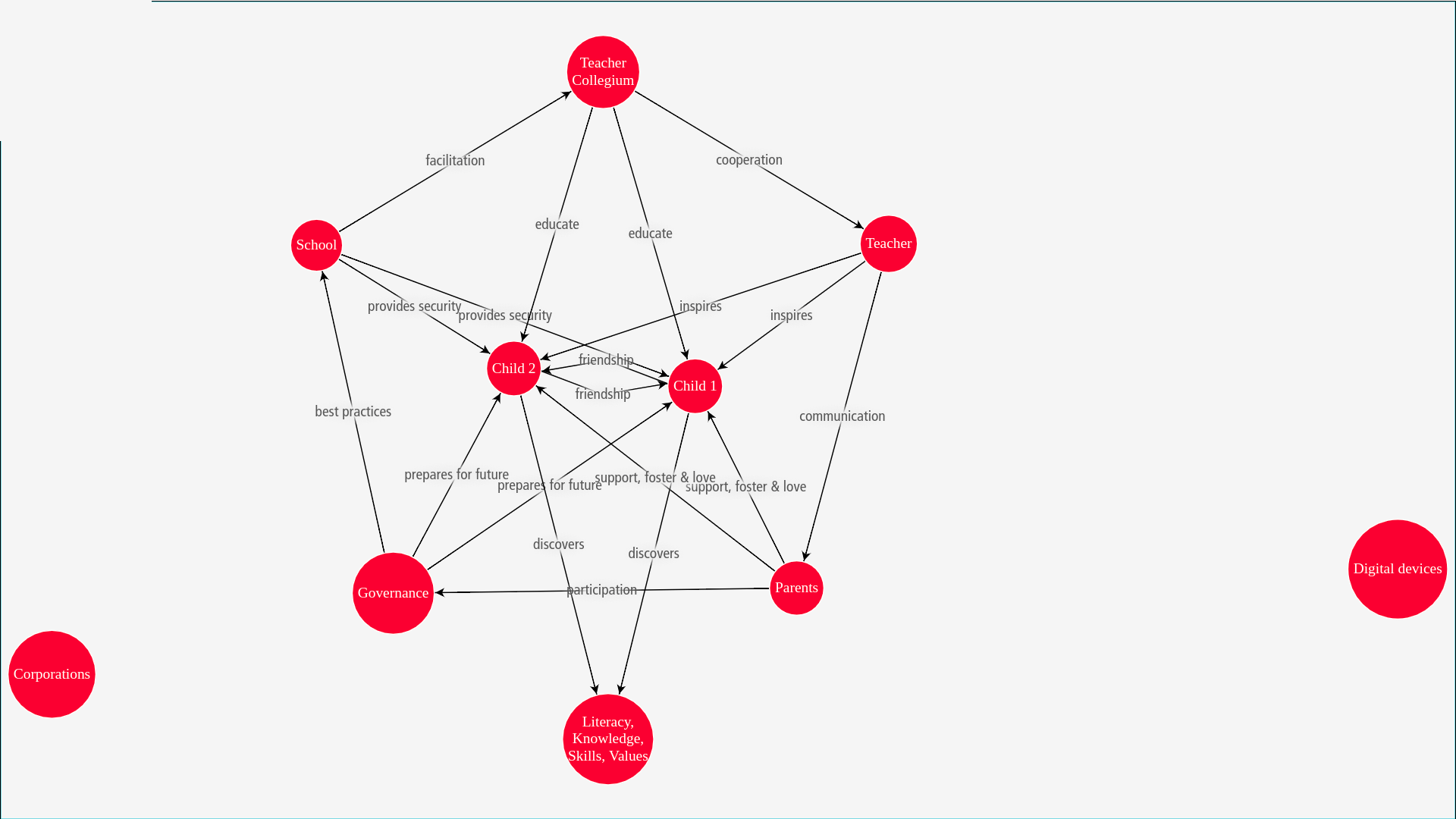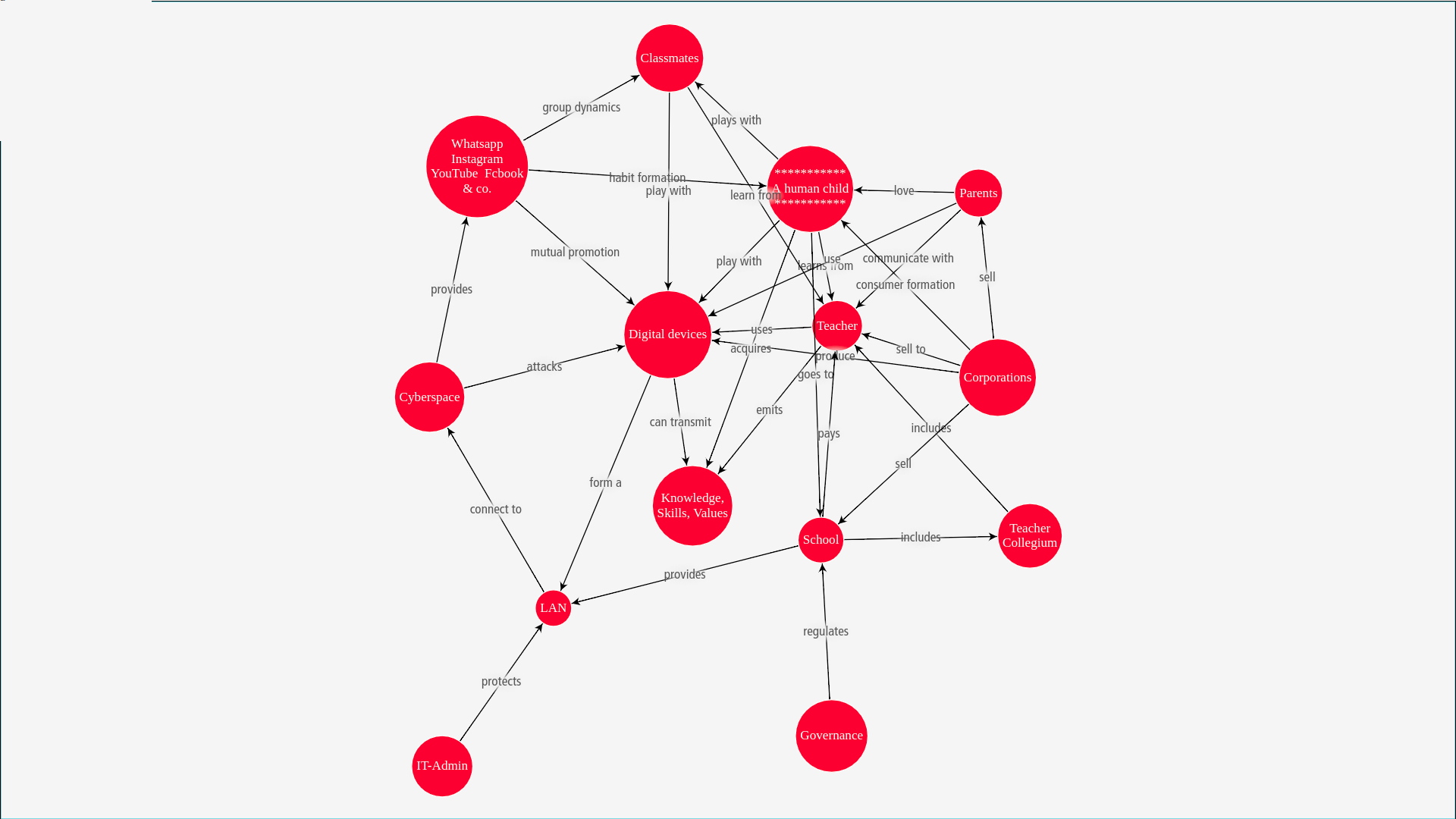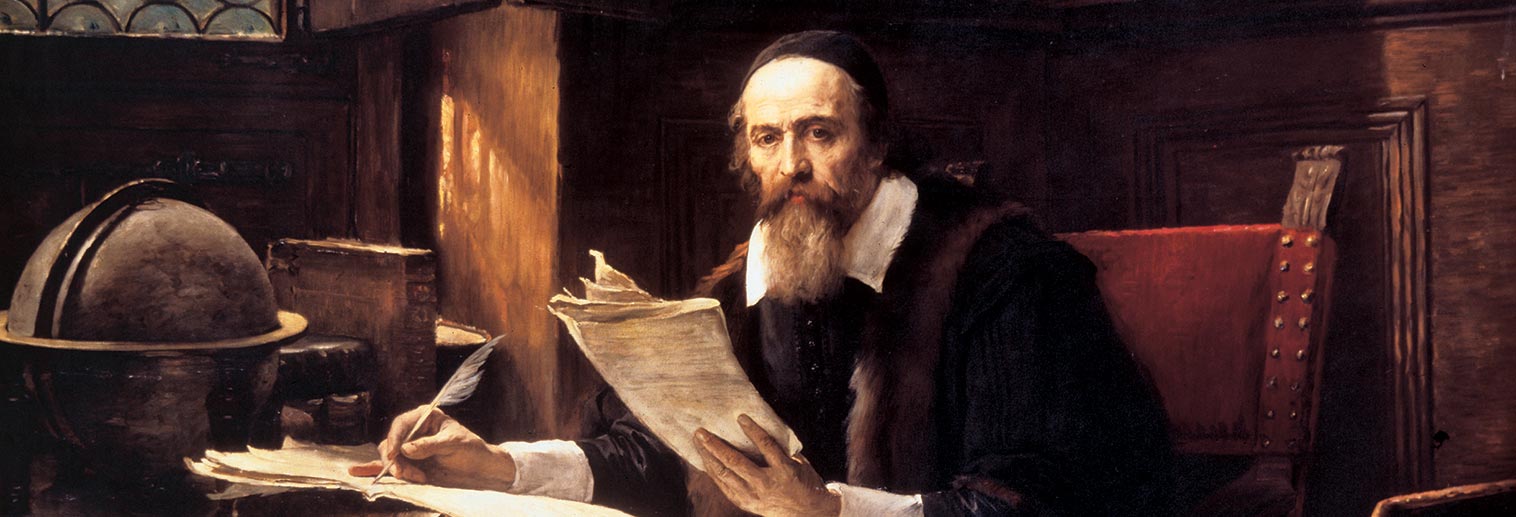 Larry O'Reilly, chief executive of Arht Media, appears as a hologram
at Imperial College Business School in London © Anna Gordon/FT
Larry O'Reilly, chief executive of Arht Media, appears as a hologram
at Imperial College Business School in London © Anna Gordon/FTDidactics is science of teaching. And teaching is an art. In this seminar we shall move from present all the way to origins of "school" in order to understand why contemporary education systems are as they are and how shall they potentially evolve. We shall discuss the extent in which digital instruments (computers, beamers, holograms etc.) and practices transform and shall transform the Learner, Teacher and their mutual relation.
discussion & lecture seminar accompanied by Prof. Dr. Dr. Daniel Devatman Hromada




- Introductio
- Questio
- Disputatio
- Praeparatio
- Who are You ?
- Who am I ?
- What is Prolegomena to Educatio Digitale ?
- How to validate this course ?
with a neighbor sitting to Your left side and try to find agreement concerning at least one already presented "goals".
Handouts available at https://bildung.digital.udk-berlin.de/didactic/handouts


- Repetitio
- Lectio
- Questio
- Disputatio
- Definitio
- Praeparatio
with a neighbor sitting to Your right side and try to find agreement in at least 2 definitions / attributes. Remember: this is a kind of question where there are no false or right answers.
with a neighbor sitting to Your left side and try to find agreement concerning at least one already presented "goals".
(from my article "Digital education: ”education-with” / ”education-about” distinction and the teleological definition" submitted to journal Minerva (2019) )
- decide whether You would like to validate this seminar as members of digital or non-digital group
- fill the Digitalisation survey and bring it
- read first 2 pages from the paper 'Digital education: ”education-with” / ”education-about"' (c.f. https://bildung.digital.udk-berlin.de/didactic )
 Larry O'Reilly, chief executive of Arht Media, appears as a hologram
at Imperial College Business School in London © Anna Gordon/FT
Larry O'Reilly, chief executive of Arht Media, appears as a hologram
at Imperial College Business School in London © Anna Gordon/FT- Administratio
- Repetitio ("What is goal of education ?"
- Continuatio ("What is digital education ?")
- Lectio & ludum
- Questio ("What is a didactic instrument ?") & disputatio
- Praeparatio
- there is no course next week (invited speaker at Campus Innovation conference in Hamburg)
- on 12.12 there will be a mini-symposium "On teaching #0: Ethics and mathematics in the post-digital world" in Medienhaus
- if You attend the symposium You validate 2 attendances for this course
- You can also gain an attendance point by drawing / visualizing an answer to a question like:
What is goal of education ?What is digital education ?
What is a digital fairy-tale ?
How does a intuition-fostering instrument looks like ?
Etymology
From Middle English instrument, from Old French instrument, from Latin īnstrūmentum (“an implement, tool”), suffix -mentum.
- A device used to produce music.
quotations ▼
- The violinist was a master of her instrument.
- A means or agency for achieving an effect. quotations ▼
- A measuring or displaying device.
- The instrument detected an increase in radioactivity.
- A tool, implement used for manipulation or measurement.
- The dentist set down his tray of instruments.
- The scientist recorded the temperature with a thermometer but wished he had a more accurate instrument.
- (law) A legal document, such as a contract, deed, trust, mortgage, power, indenture, or will.
- A bond indenture is the instrument that gives a bond its value.
- Negotiable instruments are the foundation of the debt markets.
- (figuratively) A person used as a mere tool for achieving a goal.
- digital (electronic) / non-digital
- please watch the video at https://kastalia.medienhaus.udk-berlin.de/6058
- next week I will maybe not be here but the course takes place under guidance of Dr. Bagdasarov

(Prolegomena Paedagogica, page 3)
- Autonomous decision making
- Ability to react to environment to improve own state
- Ability to understand
- About reflecting ("the more one reflects, the more intelligent one is")
- Understanding abstract concepts ("ability to imagine which is not there/tangible")
- Withstand impulsive behaviour
- musical-rhythmic,
- visual-spatial,
- verbal-linguistic,
- logical-mathematical,
- bodily-kinesthetic,
- interpersonal,
- intrapersonal,
- naturalistic
Martin Heidegger

"Through Life - for Life - through Work."
learning by doing work or providing services
usefulness-oriented activity
"Expression libre"
printing press plays important role / pupils create their own tangible media
more "hands-on" and anti-authoritarian than Waldorf or Montessori
"Help me to do it myself !"
four domains of focus: Practical Life, Sensing, Language and Math
free choice from didactic instruments pre-selected by the Teacher
importance of classrom's spatial setup
more "cognitive" (e.g. Polarization of attention) than Steiner or Freinet
"Thinking / Feeling / Willing"
artistic / creative practice integral part of an epoch-based curriculum
older students or parents create instruments for younger kids
preference for natural (wood, clay, wool) materials
more φαντασία -oriented than Montessori or Freinet
"Head. Heart. Hand"
child-oriented and NOT market-oriented attitude ("We are teachers and not businessmen.")
integrative, holistic and synthetic
increased amount of manual, haptic or corporal activity
higher amount of parent and pupil participation
egalitarian interaction between classes and ages
own instruments and media



.png)
Enlightenment is man's emergence from his self-imposed nonage. Nonage is the inability to use one's own understanding without another's guidance. This nonage is self-imposed if its cause lies not in lack of understanding but in indecision and lack of courage to use one's own mind without another's guidance. Dare to know! (Sapere aude.) "Have the courage to use your own understanding," is therefore the motto of the enlightenment.
Laziness and cowardice are the reasons why such a large part of mankind gladly remain minors all their lives, long after nature has freed them from external guidance. They are the reasons why it is so easy for others to set themselves up as guardians. It is so comfortable to be a minor. If I have a book that thinks for me, a pastor who acts as my conscience, a physician who prescribes my diet, and so on--then I have no need to exert myself. I have no need to think, if only I can pay; others will take care of that disagreeable business for me. Those guardians who have kindly taken supervision upon themselves see to it that the overwhelming majority of mankind--among them the entire fair sex--should consider the step to maturity, not only as hard, but as extremely dangerous. First, these guardians make their domestic cattle stupid and carefully prevent the docile creatures from taking a single step without the leading-strings to which they have fastened them. Then they show them the danger that would threaten them if they should try to walk by themselves. Now this danger is really not very great; after stumbling a few times they would, at last, learn to walk. However, examples of such failures intimidate and generally discourage all further attempts.
Thus it is very difficult for the individual to work himself out of the nonage which has become almost second nature to him. He has even grown to like it, and is at first really incapable of using his own understanding because he has never been permitted to try it. Dogmas and formulas, these mechanical tools designed for reasonable use--or rather abuse--of his natural gifts, are the fetters of an everlasting nonage. The man who casts them off would make an uncertain leap over the narrowest ditch, because he is not used to such free movement. That is why there are only a few men who walk firmly, and who have emerged from nonage by cultivating their own minds.
It is more nearly possible, however, for the public to enlighten itself; indeed, if it is only given freedom, enlightenment is almost inevitable. There will always be a few independent thinkers, even among the self-appointed guardians of the multitude. Once such men have thrown off the yoke of nonage, they will spread about them the spirit of a reasonable appreciation of man's value and of his duty to think for himself. It is especially to be noted that the public which was earlier brought under the yoke by these men afterwards forces these very guardians to remain in submission, if it is so incited by some of its guardians who are themselves incapable of any enlightenment. That shows how pernicious it is to implant prejudices: they will eventually revenge themselves upon their authors or their authors' descendants. Therefore, a public can achieve enlightenment only slowly. A revolution may bring about the end of a personal despotism or of avaricious tyrannical oppression, but never a true reform of modes of thought. New prejudices will serve, in place of the old, as guide lines for the unthinking multitude.
This enlightenment requires nothing but freedom--and the most innocent of all that may be called "freedom": freedom to make public use of one's reason in all matters. Now I hear the cry from all sides: "Do not argue!" The officer says: "Do not argue--drill!" The tax collector: "Do not argue--pay!" The pastor: "Do not argue--believe!" Only one ruler in the world says: "Argue as much as you please, but obey!" We find restrictions on freedom everywhere. But which restriction is harmful to enlightenment? Which restriction is innocent, and which advances enlightenment? I reply: the public use of one's reason must be free at all times, and this alone can bring enlightenment to mankind.
On the other hand, the private use of reason may frequently be narrowly restricted without especially hindering the progress of enlightenment. By "public use of one's reason" I mean that use which a man, as scholar, makes of it before the reading public. I call "private use" that use which a man makes of his reason in a civic post that has been entrusted to him. In some affairs affecting the interest of the community a certain [governmental] mechanism is necessary in which some members of the community remain passive. This creates an artificial unanimity which will serve the fulfillment of public objectives, or at least keep these objectives from being destroyed. Here arguing is not permitted: one must obey. Insofar as a part of this machine considers himself at the same time a member of a universal community--a world society of citizens--(let us say that he thinks of himself as a scholar rationally addressing his public through his writings) he may indeed argue, and the affairs with which he is associated in part as a passive member will not suffer. Thus it would be very unfortunate if an officer on duty and under orders from his superiors should want to criticize the appropriateness or utility of his orders. He must obey. But as a scholar he could not rightfully be prevented from taking notice of the mistakes in the military service and from submitting his views to his public for its judgment. The citizen cannot refuse to pay the taxes levied upon him; indeed, impertinent censure of such taxes could be punished as a scandal that might cause general disobedience. Nevertheless, this man does not violate the duties of a citizen if, as a scholar, he publicly expresses his objections to the impropriety or possible injustice of such levies. A pastor, too, is bound to preach to his congregation in accord with the doctrines of the church which he serves, for he was ordained on that condition. But as a scholar he has full freedom, indeed the obligation, to communicate to his public all his carefully examined and constructive thoughts concerning errors in that doctrine and his proposals concerning improvement of religious dogma and church institutions. This is nothing that could burden his conscience. For what he teaches in pursuance of his office as representative of the church, he represents as something which he is not free to teach as he sees it. He speaks as one who is employed to speak in the name and under the orders of another. He will say: "Our church teaches this or that; these are the proofs which it employs." Thus he will benefit his congregation as much as possible by presenting doctrines to which he may not subscribe with full conviction. He can commit himself to teach them because it is not completely impossible that they may contain hidden truth. In any event, he has found nothing in the doctrines that contradicts the heart of religion. For if he believed that such contradictions existed he would not be able to administer his office with a clear conscience. He would have to resign it. Therefore the use which a scholar makes of his reason before the congregation that employs him is only a private use, for no matter how sizable, this is only a domestic audience. In view of this he, as preacher, is not free and ought not to be free, since he is carrying out the orders of others. On the other hand, as the scholar who speaks to his own public (the world) through his writings, the minister in the public use of his reason enjoys unlimited freedom to use his own reason and to speak for himself. That the spiritual guardians of the people should themselves be treated as minors is an absurdity which would result in perpetuating absurdities.
But should a society of ministers, say a Church Council, . . . have the right to commit itself by oath to a certain unalterable doctrine, in order to secure perpetual guardianship over all its members and through them over the people? I say that this is quite impossible. Such a contract, concluded to keep all further enlightenment from humanity, is simply null and void even if it should be confirmed by the sovereign power, by parliaments, and the most solemn treaties. An epoch cannot conclude a pact that will commit succeeding ages, prevent them from increasing their significant insights, purging themselves of errors, and generally progressing in enlightenment. That would be a crime against human nature whose proper destiny lies precisely in such progress. Therefore, succeeding ages are fully entitled to repudiate such decisions as unauthorized and outrageous. The touchstone of all those decisions that may be made into law for a people lies in this question: Could a people impose such a law upon itself? Now it might be possible to introduce a certain order for a definite short period of time in expectation of better order. But, while this provisional order continues, each citizen (above all, each pastor acting as a scholar) should be left free to publish his criticisms of the faults of existing institutions. This should continue until public understanding of these matters has gone so far that, by uniting the voices of many (although not necessarily all) scholars, reform proposals could be brought before the sovereign to protect those congregations which had decided according to their best lights upon an altered religious order, without, however, hindering those who want to remain true to the old institutions. But to agree to a perpetual religious constitution which is not publicly questioned by anyone would be, as it were, to annihilate a period of time in the progress of man's improvement. This must be absolutely forbidden.
A man may postpone his own enlightenment, but only for a limited period of time. And to give up enlightenment altogether, either for oneself or one's descendants, is to violate and to trample upon the sacred rights of man. What a people may not decide for itself may even less be decided for it by a monarch, for his reputation as a ruler consists precisely in the way in which he unites the will of the whole people within his own. If he only sees to it that all true or supposed [religious] improvement remains in step with the civic order, he can for the rest leave his subjects alone to do what they find necessary for the salvation of their souls. Salvation is none of his business; it is his business to prevent one man from forcibly keeping another from determining and promoting his salvation to the best of his ability. Indeed, it would be prejudicial to his majesty if he meddled in these matters and supervised the writings in which his subjects seek to bring their [religious] views into the open, even when he does this from his own highest insight, because then he exposes himself to the reproach: Caesar non est supra grammaticos. 2 It is worse when he debases his sovereign power so far as to support the spiritual despotism of a few tyrants in his state over the rest of his subjects.
When we ask, Are we now living in an enlightened age? the answer is, No, but we live in an age of enlightenment. As matters now stand it is still far from true that men are already capable of using their own reason in religious matters confidently and correctly without external guidance. Still, we have some obvious indications that the field of working toward the goal [of religious truth] is now opened. What is more, the hindrances against general enlightenment or the emergence from self-imposed nonage are gradually diminishing. In this respect this is the age of the enlightenment and the century of Frederick [the Great].
A prince ought not to deem it beneath his dignity to state that he considers it his duty not to dictate anything to his subjects in religious matters, but to leave them complete freedom. If he repudiates the arrogant word "tolerant", he is himself enlightened; he deserves to be praised by a grateful world and posterity as that man who was the first to liberate mankind from dependence, at least on the government, and let everybody use his own reason in matters of conscience. Under his reign, honorable pastors, acting as scholars and regardless of the duties of their office, can freely and openly publish their ideas to the world for inspection, although they deviate here and there from accepted doctrine. This is even more true of every person not restrained by any oath of office. This spirit of freedom is spreading beyond the boundaries [of Prussia] even where it has to struggle against the external hindrances established by a government that fails to grasp its true interest. [Frederick's Prussia] is a shining example that freedom need not cause the least worry concerning public order or the unity of the community. When one does not deliberately attempt to keep men in barbarism, they will gradually work out of that condition by themselves.
I have emphasized the main point of the enlightenment--man's emergence from his self-imposed nonage--primarily in religious matters, because our rulers have no interest in playing the guardian to their subjects in the arts and sciences. Above all, nonage in religion is not only the most harmful but the most dishonorable. But the disposition of a sovereign ruler who favors freedom in the arts and sciences goes even further: he knows that there is no danger in permitting his subjects to make public use of their reason and to publish their ideas concerning a better constitution, as well as candid criticism of existing basic laws. We already have a striking example [of such freedom], and no monarch can match the one whom we venerate.
But only the man who is himself enlightened, who is not afraid of shadows, and who commands at the same time a well disciplined and numerous army as guarantor of public peace--only he can say what [the sovereign of] a free state cannot dare to say: "Argue as much as you like, and about what you like, but obey!" Thus we observe here as elsewhere in human affairs, in which almost everything is paradoxical, a surprising and unexpected course of events: a large degree of civic freedom appears to be of advantage to the intellectual freedom of the people, yet at the same time it establishes insurmountable barriers. A lesser degree of civic freedom, however, creates room to let that free spirit expand to the limits of its capacity. Nature, then, has carefully cultivated the seed within the hard core--namely the urge for and the vocation of free thought. And this free thought gradually reacts back on the modes of thought of the people, and men become more and more capable of acting in freedom. At last free thought acts even on the fundamentals of government and the state finds it agreeable to treat man, who is now more than a machine, in accord with his dignity.
1. Translated by Mary C. Smith.
2. [Caesar is not above grammarians.]
- Leiter der Sektion des Kultus und des öffentlichen Unterrichts im preußischen Innenministerium
- Humboldtsches Bildungsideal: Selbstbestimmung (Autonomie) und Mündigkeit
- andere wichtige Begriffe: akademische Freiheit, Weltbürgertum
"Anregung aller Kräfte des Menschen, damit diese sich über die Aneignung der Welt entfalten und zu einer sich selbst bestimmenden Individualität und Persönlichkeit führen“."
-
Gründung der Pädagogik als wissenschaftliche Disziplin
-
Hauptbegriffe: Vertiefung (Klarheit, Assoziation), Interesse (Merken, Erwarten), Besinnung (System, Methode), Begehrung (Fordern, Handeln)
"Der Pädagoge vergleicht einen Zögling nicht mit dem anderen, sondern mit sich selbst !"
" There has to be a theory which departs from relation between older and younger generation and which poses a question: What does the older generation want from the younger one ? "



Men. What was it? and who were they?
Soc. Some of them were priests and priestesses, who had studied how they might be able to give a reason of their profession: there, have been poets also, who spoke of these things by inspiration, like Pindar, and many others who were inspired. And they say-mark, now, and see whether their words are true-they say that the soul of man is immortal, and at one time has an end, which is termed dying, and at another time is born again, but is never destroyed. And the moral is, that a man ought to live always in perfect holiness. "For in the ninth year Persephone sends the souls of those from whom she has received the penalty of ancient crime back again from beneath into the light of the sun above, and these are they who become noble kings and mighty men and great in wisdom and are called saintly heroes in after ages." The soul, then, as being immortal, and having been born again many times, rand having seen all things that exist, whether in this world or in the world below, has knowledge of them all; and it is no wonder that she should be able to call to remembrance all that she ever knew about virtue, and about everything; for as all nature is akin, and the soul has learned all things; there is no difficulty in her eliciting or as men say learning, out of a single recollection -all the rest, if a man is strenuous and does not faint; for all enquiry and all learning is but recollection. And therefore we ought not to listen to this sophistical argument about the impossibility of enquiry: for it will make us idle; and is sweet only to the sluggard; but the other saying will make us active and inquisitive. In that confiding, I will gladly enquire with you into the nature of virtue.
Men. Yes, Socrates; but what do you mean by saying that we do not learn, and that what we call learning is only a process of recollection? Can you teach me how this is?
Soc. I told you, Meno, just now that you were a rogue, and now you ask whether I can teach you, when I am saying that there is no teaching, but only recollection; and thus you imagine that you will involve me in a contradiction.
Men. Indeed, Socrates, I protest that I had no such intention. I only asked the question from habit; but if you can prove to me that what you say is true, I wish that you would.
Soc. It will be no easy matter, but I will try to please you to the utmost of my power. Suppose that you call one of your numerous attendants, that I may demonstrate on him.
Men. Certainly. Come hither, boy.
Soc. He is Greek, and speaks Greek, does he not?
Men. Yes, indeed; he was born in the house.
Soc. Attend now to the questions which I ask him, and observe whether he learns of me or only remembers.
Men. I will.
Soc. Tell me, boy, do you know that a figure like this is a square?
Boy. I do.
Soc. And you know that a square figure has these four lines equal?
Boy. Certainly.
Soc. And these lines which I have drawn through the middle of the square are also equal?
Boy. Yes.
Soc. A square may be of any size?
Boy. Certainly.
Soc. And if one side of the figure be of two feet, and the other side be of two feet, how much will the whole be? Let me explain: if in one direction the space was of two feet, and in other direction of one foot, the whole would be of two feet taken once?
Boy. Yes.
Soc. But since this side is also of two feet, there are twice two feet?
Boy. There are.
Soc. Then the square is of twice two feet?
Boy. Yes.
Soc. And how many are twice two feet? count and tell me.
Boy. Four, Socrates.
Soc. And might there not be another square twice as large as this, and having like this the lines equal?
Boy. Yes.
Soc. And of how many feet will that be?
Boy. Of eight feet.
Soc. And now try and tell me the length of the line which forms the side of that double square: this is two feet-what will that be?
Boy. Clearly, Socrates, it will be double.
Soc. Do you observe, Meno, that I am not teaching the boy anything, but only asking him questions; and now he fancies that he knows how long a line is necessary in order to produce a figure of eight square feet; does he not?
Men. Yes.
Soc. And does he really know?
Men. Certainly not.
Soc. He only guesses that because the square is double, the line is double.
Men. True.
Soc. Observe him while he recalls the steps in regular order. (To the Boy.) Tell me, boy, do you assert that a double space comes from a double line? Remember that I am not speaking of an oblong, but of a figure equal every way, and twice the size of this-that is to say of eight feet; and I want to know whether you still say that a double square comes from double line?
Boy. Yes.
Soc. But does not this line become doubled if we add another such line here?
Boy. Certainly.
Soc. And four such lines will make a space containing eight feet?
Boy. Yes.
Soc. Let us describe such a figure: Would you not say that this is the figure of eight feet?
Boy. Yes.
Soc. And are there not these four divisions in the figure, each of which is equal to the figure of four feet?
Boy. True.
Soc. And is not that four times four?
Boy. Certainly.
Soc. And four times is not double?
Boy. No, indeed.
Soc. But how much?
Boy. Four times as much.
Soc. Therefore the double line, boy, has given a space, not twice, but four times as much.
Boy. True.
Soc. Four times four are sixteen-are they not?
Boy. Yes.
Soc. What line would give you a space of right feet, as this gives one of sixteen feet;-do you see?
Boy. Yes.
Soc. And the space of four feet is made from this half line?
Boy. Yes.
Soc. Good; and is not a space of eight feet twice the size of this, and half the size of the other?
Boy. Certainly.
Soc. Such a space, then, will be made out of a line greater than this one, and less than that one?
Boy. Yes; I think so.
Soc. Very good; I like to hear you say what you think. And now tell me, is not this a line of two feet and that of four?
Boy. Yes.
Soc. Then the line which forms the side of eight feet ought to be more than this line of two feet, and less than the other of four feet?
Boy. It ought.
Soc. Try and see if you can tell me how much it will be.
Boy. Three feet.
Soc. Then if we add a half to this line of two, that will be the line of three. Here are two and there is one; and on the other side, here are two also and there is one: and that makes the figure of which you speak?
Boy. Yes.
Soc. But if there are three feet this way and three feet that way, the whole space will be three times three feet?
Boy. That is evident.
Soc. And how much are three times three feet?
Boy. Nine.
Soc. And how much is the double of four?
Boy. Eight.
Soc. Then the figure of eight is not made out of a of three?
Boy. No.
Soc. But from what line?-tell me exactly; and if you would rather not reckon, try and show me the line.
Boy. Indeed, Socrates, I do not know.
Soc. Do you see, Meno, what advances he has made in his power of recollection? He did not know at first, and he does not know now, what is the side of a figure of eight feet: but then he thought that he knew, and answered confidently as if he knew, and had no difficulty; now he has a difficulty, and neither knows nor fancies that he knows.
Men. True.
Soc. Is he not better off in knowing his ignorance?
Men. I think that he is.
Soc. If we have made him doubt, and given him the "torpedo's shock," have we done him any harm?
Men. I think not.
Soc. We have certainly, as would seem, assisted him in some degree to the discovery of the truth; and now he will wish to remedy his ignorance, but then he would have been ready to tell all the world again and again that the double space should have a double side.
Men. True.
Soc. But do you suppose that he would ever have enquired into or learned what he fancied that he knew, though he was really ignorant of it, until he had fallen into perplexity under the idea that he did not know, and had desired to know?
Men. I think not, Socrates.
Soc. Then he was the better for the torpedo's touch?
Men. I think so.
Soc. Mark now the farther development. I shall only ask him, and not teach him, and he shall share the enquiry with me: and do you watch and see if you find me telling or explaining anything to him, instead of eliciting his opinion. Tell me, boy, is not this a square of four feet which I have drawn?
Boy. Yes.
Soc. And now I add another square equal to the former one?
Boy. Yes.
Soc. And a third, which is equal to either of them?
Boy. Yes.
Soc. Suppose that we fill up the vacant corner?
Boy. Very good.
Soc. Here, then, there are four equal spaces?
Boy. Yes.
Soc. And how many times larger is this space than this other?
Boy. Four times.
Soc. But it ought to have been twice only, as you will remember.
Boy. True.
Soc. And does not this line, reaching from corner to corner, bisect each of these spaces?
Boy. Yes.
Soc. And are there not here four equal lines which contain this space?
Boy. There are.
Soc. Look and see how much this space is.
Boy. I do not understand.
Soc. Has not each interior line cut off half of the four spaces?
Boy. Yes.
Soc. And how many spaces are there in this section?
Boy. Four.
Soc. And how many in this?
Boy. Two.
Soc. And four is how many times two?
Boy. Twice.
Soc. And this space is of how many feet?
Boy. Of eight feet.
Soc. And from what line do you get this figure?
Boy. From this.
Soc. That is, from the line which extends from corner to corner of the figure of four feet?
Boy. Yes.
Soc. And that is the line which the learned call the diagonal. And if this is the proper name, then you, Meno's slave, are prepared to affirm that the double space is the square of the diagonal?
Boy. Certainly, Socrates.
Soc. What do you say of him, Meno? Were not all these answers given out of his own head?
Men. Yes, they were all his own.
Soc. And yet, as we were just now saying, he did not know?
Men. True.
Soc. But still he had in him those notions of his-had he not?
Men. Yes.
Soc. Then he who does not know may still have true notions of that which he does not know?
Men. He has.
Soc. And at present these notions have just been stirred up in him, as in a dream; but if he were frequently asked the same questions, in different forms, he would know as well as any one at last?
Men. I dare say.
Soc. Without any one teaching him he will recover his knowledge for himself, if he is only asked questions?
Men. Yes.
Soc. And this spontaneous recovery of knowledge in him is recollection?
Men. True.
Soc. And this knowledge which he now has must he not either have acquired or always possessed?
Men. Yes.
Soc. But if he always possessed this knowledge he would always have known; or if he has acquired the knowledge he could not have acquired it in this life, unless he has been taught geometry; for he may be made to do the same with all geometry and every other branch of knowledge. Now, has any one ever taught him all this? You must know about him, if, as you say, he was born and bred in your house.
Men. And I am certain that no one ever did teach him.
Soc. And yet he has the knowledge?
Men. The fact, Socrates, is undeniable.
Soc. But if he did not acquire the knowledge in this life, then he must have had and learned it at some other time?
Men. Clearly he must.
2) target audience (pre-schoolers ? pupils ? adolescents ? adults ? alzheimer patients ?)
3) instruments and media You are going to use (digital media not allowed for non-dig. groups)
Make sure You define:
0) where ? (e.g. classroom, hall, street, garden, atelier)
1) question which is going to be addressed by the course
2) target audience (pre-schoolers ? pupils ? adolescents ? adults ? alzheimer patients ?)
3) instruments and media You are going to use (at least one kind of digital instrument or medium obligatory for members of the dig. group)


- musical-rhythmic,
- visual-spatial,
- verbal-linguistic,
- logical-mathematical,
- bodily-kinesthetic,
- interpersonal,
- intrapersonal,
- naturalistic

"Head. Heart. Hand"
child-oriented and NOT market-oriented attitude ("We are teachers and not businessmen.")
integrative, holistic and synthetic
increased amount of manual, haptic or corporal activity
higher amount of parent and pupil participation
egalitarian interaction between classes and ages
own instruments and media
.png)







/